For example, Juniper Networks’ strategy is based on what it calls the ‘three Ds’ : “Deconstruct, Decompose and Design.”
“When we say the winners, what really makes a winning stack is, does it actually deliver results for your company?” said Scott Brinker, program chair for MarTech, when presenting the winners of the 2021 Stackie Awards this week. “There’s no external judging for that.”
True. But as a judge, Brinker is uniquely qualified in the marketing technology field. He’s editor of chiefmartec.com and serves as VP Platform Ecosystem for HubSpot. Of 29 entries in this year’s awards, just five were given the distinction as top stacks: Juniper Networks, Philips, Itau, Betway and SAS.
As in previous years, entrants submitted a PowerPoint slide mapping out their marketing tech stack, showing the ways each component works with the others. This year, MarTech donated $ 100 to nonprofit COOP Careers for each stack that was submitted.
At the end of Day 1 of this year’s MarTech conference, Brinker had a chance to discuss the stacks with some of the winners and offered insights into what it was about their design that got these stacks to rise to the top.
Simplicity at scale
Simple design and clear communication are crucial when mapping out a big marketing organization. Brazil-based Itau Unibanco is the largest banking institution in Latin America.
Their “constellation map” withholds the names of specific vendors but uses shapes so that viewers can see common functions at a glance, with lines connecting the flow of functionality through different layers of the stack.
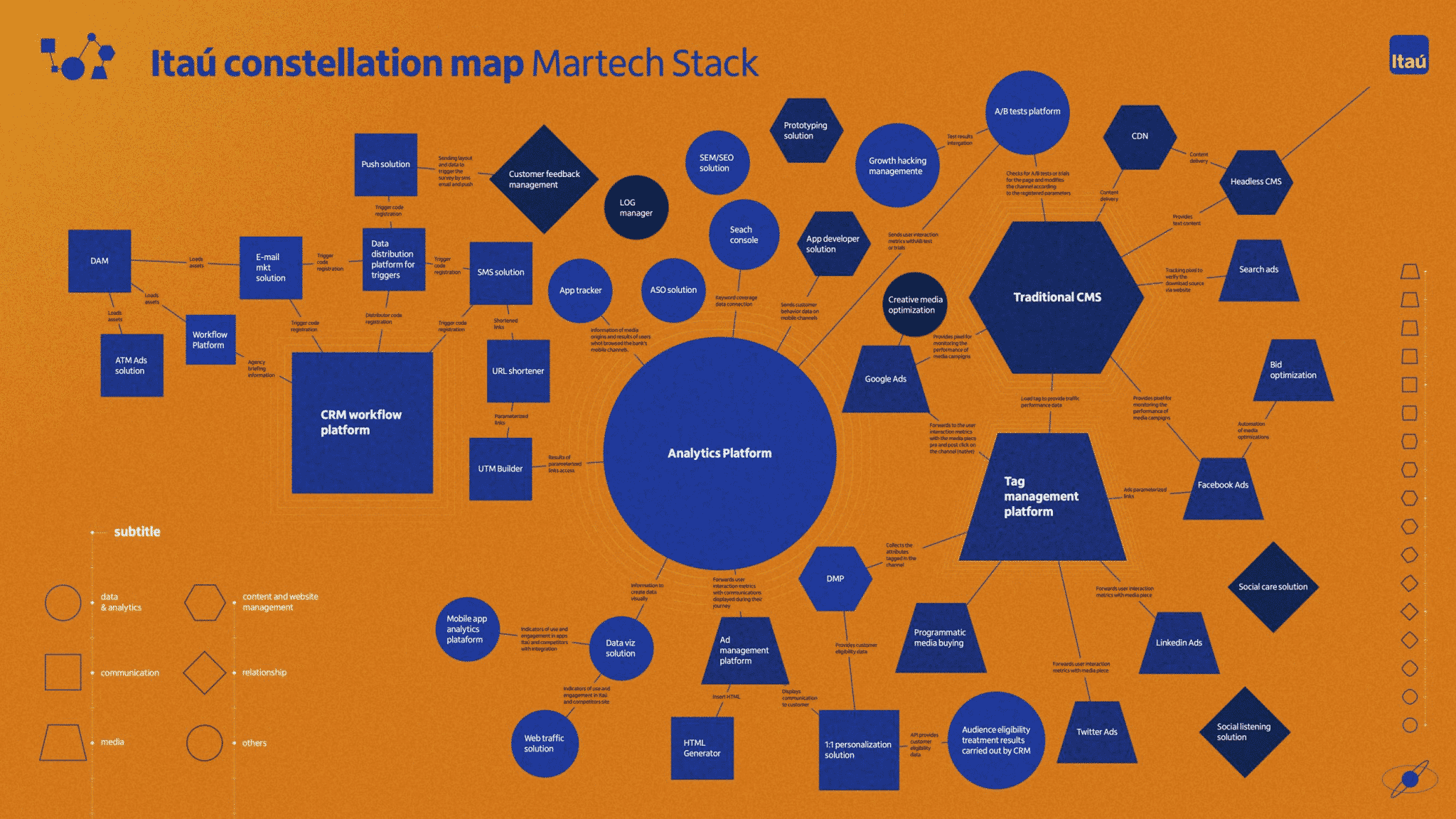
“When you actually look at what they’re explaining here in this visualization of the set of capabilities,” Brinker said, “it’s almost like synapses firing, the connections between the capabilities…they’re describing the activities that are being delivered.”
He added, ”Itau’s stack does an incredible job of showing that scope of what [marketing technology] looks like at a financial services company of their size.”
Organizing a winning hand
Gambling platform Betway has loaded the marketing technology deck in their favor with external, as well as internally-developed tools.
“You can take a look at the organization of how they think about the customer journey and going through consideration and getting customers engaged, how they look at analytics on their side and what they do to listen, the way they bring content around the community,” Brinker said.
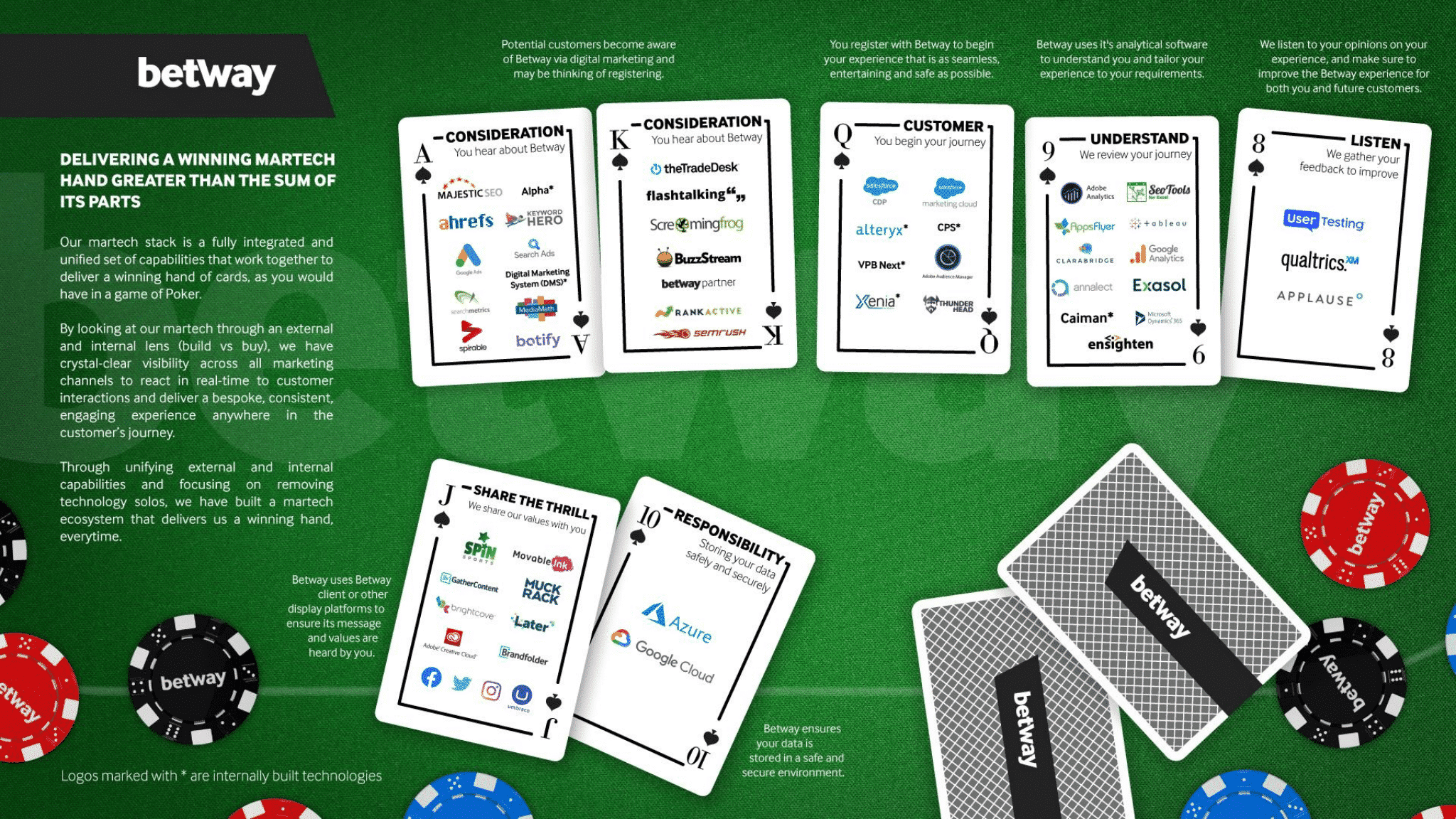
“One of the things I thought was very useful about this stack visualization is they’re also highlighting within each section the technologies that they built,” Brinker added.
In the spirit of the movement Brinker described in his Day 1 keynote talk about Big Ops, it’s evident in Betway’s stack that they are developing tools to meet specific organizational goals, especially in customer experience.
An important substack in the Betway organization is represented with its own card: responsibility. Making sure customers’ data is stored in a safe and secure environment is always a sure bet against that wild card to any brand, a data breach.
Working with others
SAS is the world’s largest private software company. In looking at their winning submission, it’s possible to see where they use their own products (analytics, email and personalization) and where they look elsewhere (advertising).
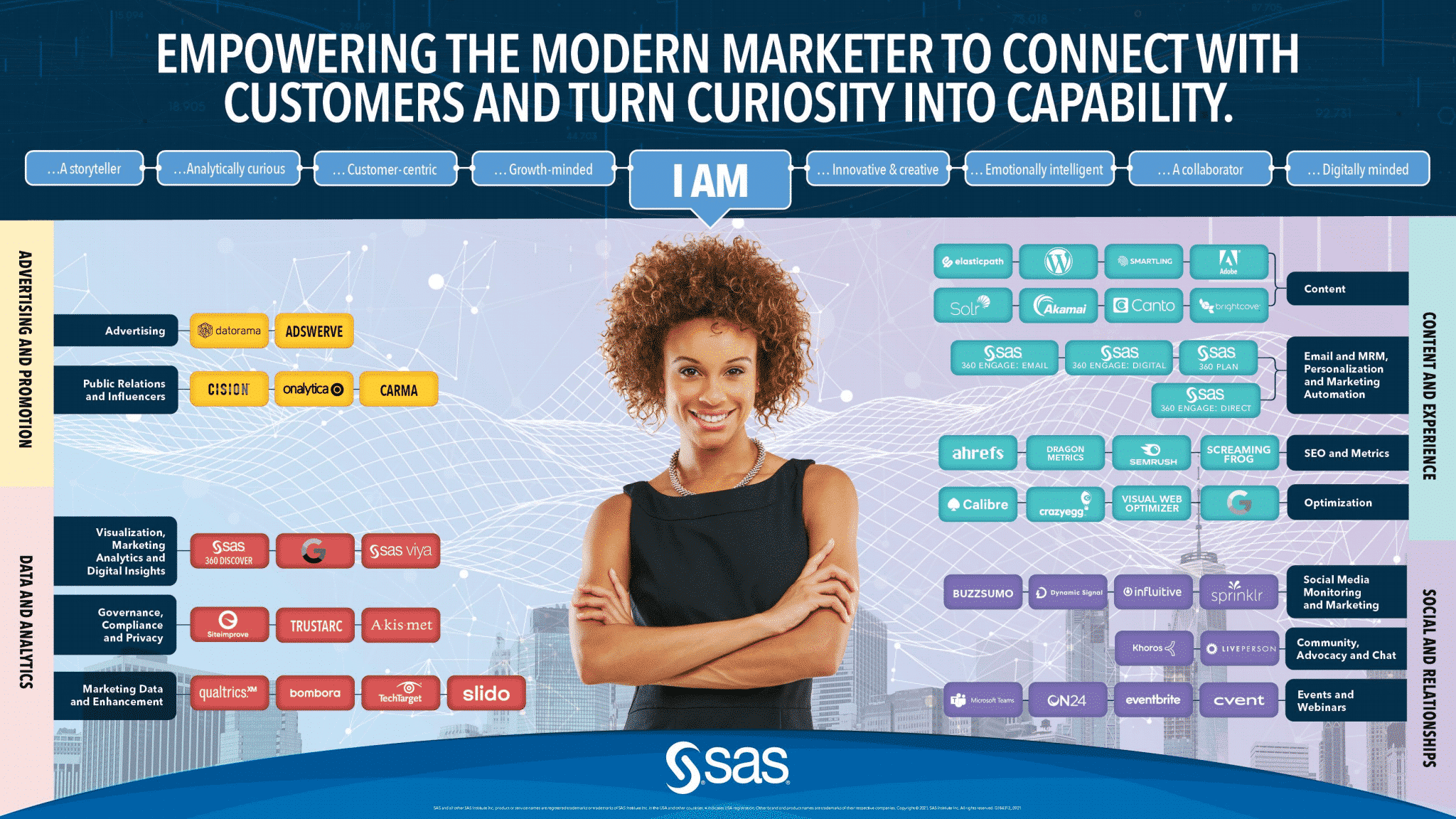
“One of the things I love about this is that it’s just so clear what the tools are that they’re using and for which particular capability,” Brinker said. “But one of the other reasons is that SAS is a software company themselves…and you can see where SAS sees its own strengths and its own capabilities, and then how they complement that with other solutions off the market.”
Keeping the customer at the center
Brinker compared the winning entry this year from Philips with their entry last year, and found an important pattern. Philips keeps their customers at the center of their stack. The tools in this year’s graphic extend outward to create a honeycomb design.
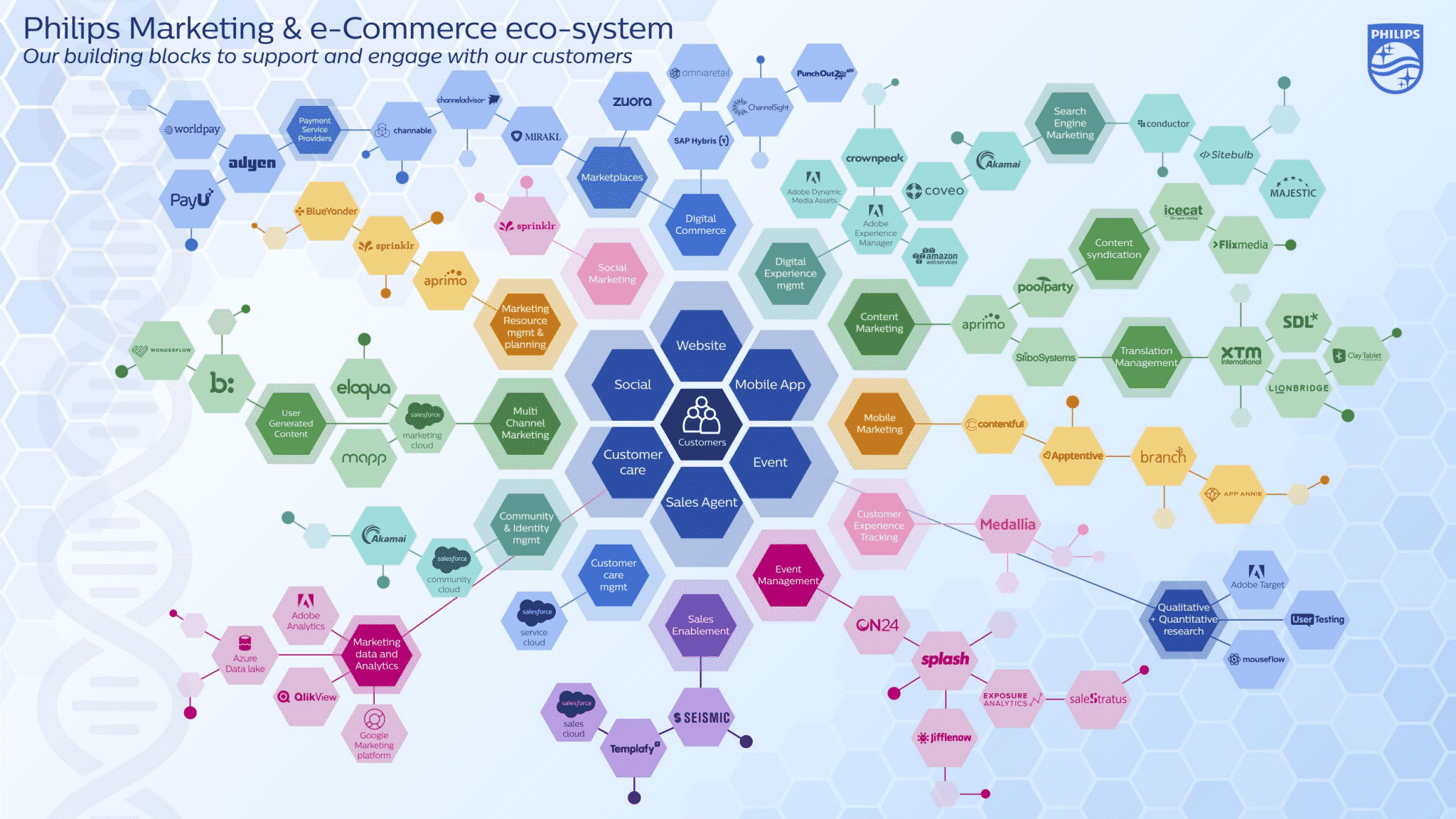
The central unit in this design is the customer, and its six-sided neighbors are customer care, sales agent, event, social, website and mobile app — the most important channels for Philips customers.
Last year, Philips represented the customer as a heart, pumping the lifeblood of the organization.
“We wanted to do something different visually this year, obviously,” said Joost van Dun, Director Experience & Conversion platforms at Philips, who joined Brinker virtually at the Day 1 event. “We wanted to shy away a bit from the functional perspective on what sort of application we have, and look more from a capability perspective, because in the end we believe the capabilities are a combination of the tools, the process and the people.”
Solid foundation and wiring
Juniper Networks used the imagery of housing, the architecture that creates spaces where customer engagement lives.
“When we think about [marketing technology] at Juniper, we think it provides a competitive advantage for us, so much to the point that it’s a critical component to our overall marketing strategy,” said Brian Cooper, Vice President, Demand, Analytics and Information at Juniper Networks.
He added, “The marketing tech strategy we have is based on a really simple concept called the ‘three D’s’ — Deconstruct, Decompose and Design.”
Essentially, map out the customer journey, as well as the specific tactics your marketing team uses to engage customers. The design part comes in by plugging in the right technology to match these tactics in an effective way along the customer journey.
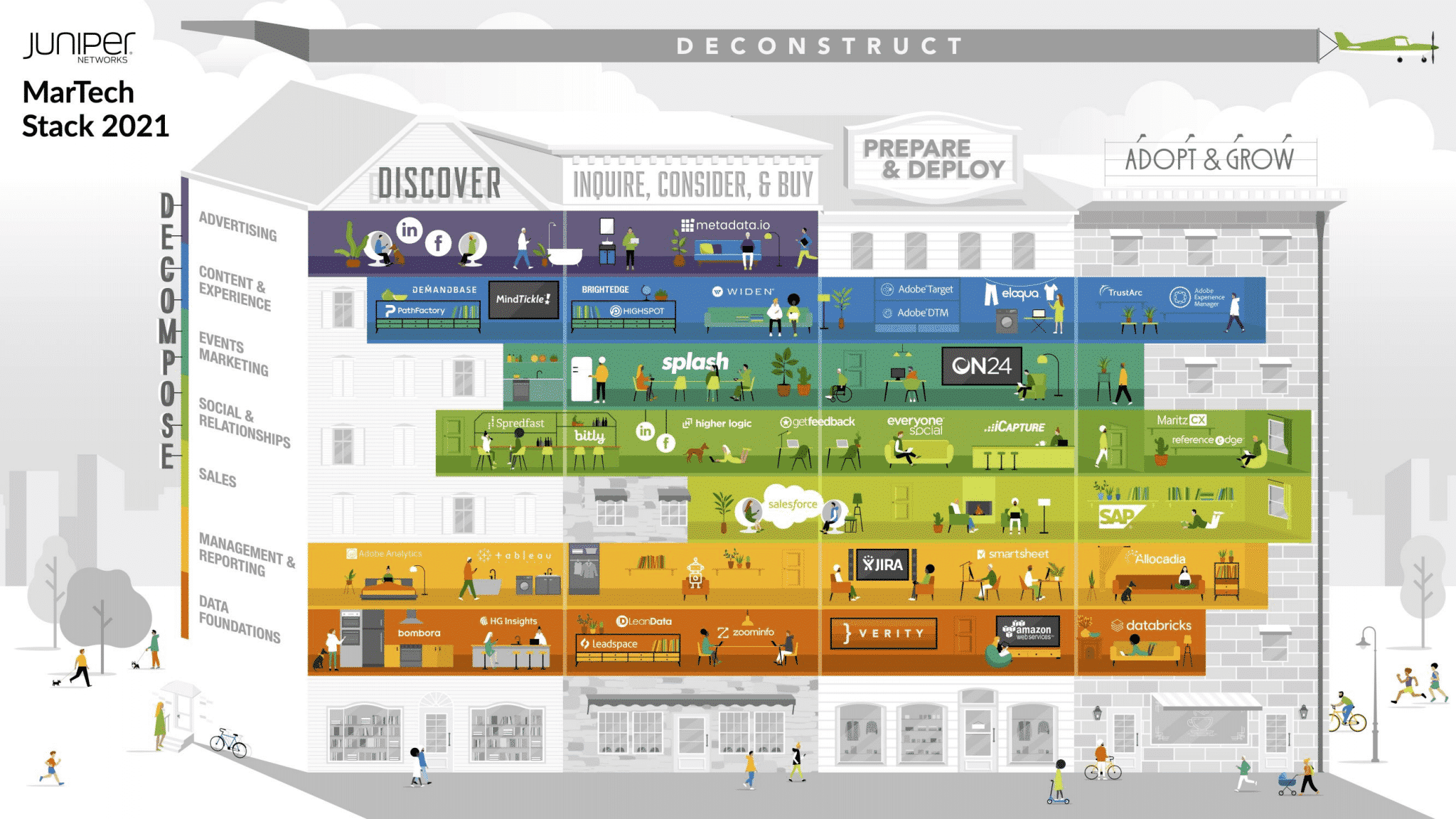
To pull it back out to the housing metaphor, to make the customer journey a modern living space, you have to equip it with the right appliances and wiring.
“I love how everyone has been very on-brand about making sure the visual representation of their stack really leans into what they provide and their corporate mission,” said Brinker, taking in the field of winners, as well as the other impressive entrants that made up the Stackies this year.
Brinker also said that all the companies that entered the Stackies should be applauded for their generosity and openness in contributing to the marketing technology community by providing insight into what technologies allow them to make an impact with customers.
The post Stackies 2021: How the winning companies think about their marketing stacks appeared first on MarTech.
(105)
